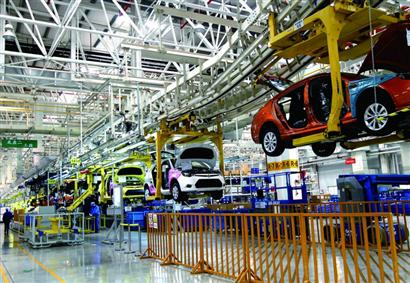

 |
Aided by finance, real estate and other emerging industries, advanced provinces in eastern China have so far witnessed a significant increase in fiscal revenue in 2016. In the same period, fiscal revenue in resource-based provinces has been dragged down by overcapacity, 21st Century Business Herald reported on Thursday.
According to statistics published by the Shanghai Municipal Finance Bureau, the city achieved a 30.6 percent increase in fiscal revenue, with a strong performance in value-added tax, corporate income tax and other major tax categories. Finance, leasing, and real estate were major sources for fiscal growth, the article explained.
Song Yijia, Director General of the Shanghai Municipal Finance Bureau, said that the significant revenue growth in personal and corporate income taxes can be attributed to the agglomeration effect of headquarters. Shanghai currently houses the regional headquarters of 558 transnational corporations.
“Reform in free trade zones is also paying off,” said Song, adding that overall taxation on items in the city's free trade zones has increased by 36 percent.
Guangdong province and Beijing municipality also set new records in their fiscal revenue numbers, with 17.1 percent and 12.8 percent growths respectively.
As for central and western China, southwestern Guizhou province managed to score a 13.5 percent increase in fiscal revenue during the first six months of 2016.
Due to overcapacity in steel, coal and other traditional industries, northeastern Liaoning province has suffered an 18.6 percent drop in revenue. Monthly figures show the negative growth trend is expanding; fiscal income growth for the first four and first five months of 2016 were negative 6.4 percent and negative 8.6 percent respectively.
However, tax income in the petrochemical and steel industries has seen a slight rebound, finishing the first half of the year with a respective 6.5 percent and 11.58 percent increase.
A similar situation can also be observed in north China's Shanxi province. From January to June, the resource-based economy accumulated 85.6 billion yuan in fiscal revenue, which is a decline of 7.4 percent from the same period in 2015.
Despite yielding a 5.59 percent growth in local fiscal revenue, northwestern Shaanxi province saw only a slim 0.44 percent boost in local taxation. Certain taxation items also experienced negative growth, such as corporate income tax, resource tax and increment tax on land value.
 Who Will Fit The Chinese Roles In Game Of Thrones?
Who Will Fit The Chinese Roles In Game Of Thrones? China's Hubei Shennongjia added to World Heritage List
China's Hubei Shennongjia added to World Heritage List "Straddling bus" starts production in east China
"Straddling bus" starts production in east China Girl goes viral for finger-long toes
Girl goes viral for finger-long toes Five made-in-China hi-tech breakthroughs
Five made-in-China hi-tech breakthroughs HK-Zhuhai-Macao Bridge to open to traffic
HK-Zhuhai-Macao Bridge to open to traffic China opens its first combined transport service to Nepal
China opens its first combined transport service to Nepal Students take stylish bikini graduations photos
Students take stylish bikini graduations photos Charming dancing students pose for graduation photos
Charming dancing students pose for graduation photos Top 10 livable Chinese cities
Top 10 livable Chinese cities Top 20 hottest women in the world in 2014
Top 20 hottest women in the world in 2014 Top 10 hardest languages to learn
Top 10 hardest languages to learn China’s Top 10 Unique Bridges, Highways and Roads
China’s Top 10 Unique Bridges, Highways and Roads Arbitration creates little more than noise
Arbitration creates little more than noise Western fast-food firms contribute to China’s economy
Western fast-food firms contribute to China’s economy Watching live streaming fur babies is entertaining, interactive and stress-relieving
Watching live streaming fur babies is entertaining, interactive and stress-relieving Visitors to Rio concerned by virus, crime and high prices
Visitors to Rio concerned by virus, crime and high pricesDay|Week